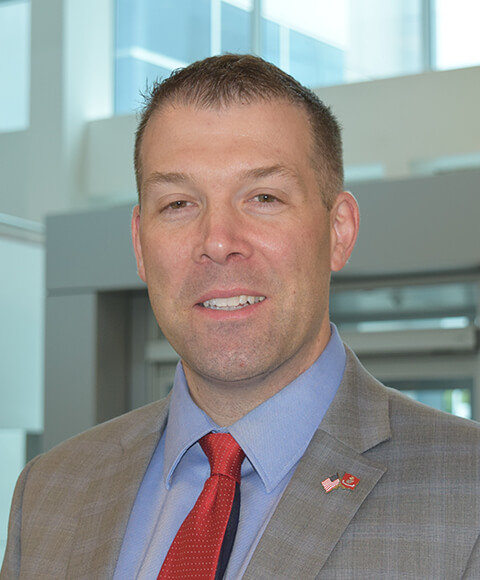Jefferson Twp. resident James Coleman was qualified for an open position at the Dayton National Cemetery, but because of a drug charge that Coleman disclosed during the job application process, any shot at employment appeared to be derailed.
Montgomery County Common Pleas Judge Dennis Adkins aimed to change that.
“I believe Mr. Coleman is dedicated to his sobriety, and he continues to attend weekly group classes,” Adkins wrote to Kevin Kelley, director of U.S. Department of Veterans Affairs human resources in Indianapolis, which handles hiring for the cemetery.
Coleman, a Navy veteran, was a graduate of the county’s Veterans Treatment Court, which celebrates its 10th anniversary this year.
The court program is an “intensive” specialty program aimed to help veterans who, after serving the country, “have ended up in the criminal justice system,” Adkins told Kelley.
“I would strongly ask that you reconsider the employment of Mr. James Coleman at the Dayton National Cemetery,” the judge wrote in the letter he shared with the Dayton Daily News.
Coleman, 53, has a job at the cemetery today, thanks in part to that letter.
A new path
Since the veterans court’s November 2013 inception, 151 defendants have graduated. Thirty-two failed to graduate.
“I haven’t seen a graduation yet where there hasn’t been tears in eyes,” Adkins said in an interview.
From 2014 through 2020, 88% of the participants have not been charged with another felony or misdemeanor, according to the court. Due to the pandemic and resources, no new study was completed after 2020, said Montgomery County Parole Officer Thomas Blatter.
The veterans court process begins with an assessment by an outreach coordinator. Defendants are arrested, their status as veterans is discovered and confirmed, and they can be referred to the program. Sometimes, jail personnel alert the court that a prisoner is a vet.
“That gives us a head start,” Adkins said.
Often, the program traces problems to a defendant’s service in the military, Adkins said. For some, drug use or post-traumatic stress accompany a service member’s transition to civilian life.
Participation in the Montgomery County program is voluntary. Adkins has seen some veterans approach the program with surprising discipline and grit, standing at a stiff “parade rest” stance in court as he addresses them, dropping “sirs” generously in their responses.
“It’s a much tougher program than regular probation,” Adkins said. The process lasts longer. Adkins sees defendants more often compared to ordinary court dockets. Defendants are paired with mentors, fellow veterans who help them navigate court requirements and treatment programs.
Most veterans thrive in civilian life. But compared to non-veteran populations, veterans have higher rates of unemployment, suicide and homelessness, said Chad Lennon, a New York City attorney, Marine Corps Reserve major and a former prosecutor in a Suffolk County, N.Y. Veterans Court.
Veterans sometimes hide mental and physical injuries to continue training and deploying with fellow members of their units, Lennon said. During service, they often find themselves in “austere environments,” asked to shoulder difficult, dangerous tasks that would be unthinkable in the civilian world, he said.
“They deploy, they come home, and they’re a different person,” Lennon said.
In 2019, the National Survey on Drug Use and Health found that 1.3 million veterans had an substance use disorder.
‘I was legally dead’
Coleman left the Navy in the 1990s with a honorable discharge and addictions to cocaine and heroin, addictions that became only more entrenched with time.
“It was actually getting to the point where I had to do drugs in order to maintain my body,” he said.
In September 2020, a police officer found him unresponsive in his parked car in Butler Twp.
“They actually said I was legally dead,” Coleman recalled in the drawl of his native South Carolina. “They had to shock my heart to bring me back, perform CPR.”
He was charged with drug possession and indicted in December 2020 for what Adkins called a “low-level drug offense.” Most of those invited to the veterans court suffer from drug addiction or mental health issues.
But the resuscitation and indictment weren’t enough to shake Coleman from complacency, at least not immediately. He declined an early invitation to the program — in fact, he didn’t report to court for a year.
But by December 2021, Coleman told a VA case worker he had had enough.
“My body was tired, my body was starting to give up,” he recalled. He had heart issues and high blood pressure.
Coleman offered to turn himself in to police.
He spent six days in Montgomery County jail suffering withdrawal, being found unresponsive yet again, this time in his cell. He was taken from jail to a three-day stay at Miami Valley Hospital’s intensive care unit.
Coleman left the hospital on a Friday and entered the VA’s drug treatment program on a Monday.
That turned out to be the first day of the rest of Coleman’s life. Soon thereafter, he began a year-long stint in the Veterans Treatment Court.
“It’s a program I would recommend to any veteran,” he said through clenched teeth, fighting tears. “It’s only hard if you make it hard. But if you want it, it’s easy.”
He paused, then added: “If it wasn’t for that program, I would probably still be on drugs.”
‘A huge motivator’
For defendants, the incentive to participate can be described in five words: “Intervention in lieu of conviction.” Sometimes called “ILC,” those enrolled in the program must follow a program of recovery and restoration.
If they complete it, charges are dismissed.
Such opportunities are sometimes called “diversion programs” or “specialty courts.” They are meant to keep defendants out of jail while reducing recidivism.
“It’s a huge motivator for a lot of the guys,” said Robert Fryman, a VA addiction therapist who worked with Coleman.
The Ohio Supreme Court authorizes the use of specialty courts. Montgomery County Common Pleas Court has a variety of such courts: a Mental Health Court, a Men’s Achievement Recovery Court/Men’s Drug Court, a “Recovery is Empowering” Court/Women’s Drug Court, as well as the Veteran’s Treatment Court.
“I believe all of these courts serve a special purpose for targeted defendants,” Montgomery County Prosecutor Mat Heck said in an email. “Our veterans often have very different needs due to the prevalence of post-traumatic stress disorder and emotional trauma. Having a specialized docket to help address the specific needs of veterans within the criminal justice system is important in helping them recover in the best way possible while still holding them accountable.”
“We take people who have real problems,” Adkins said. Sometimes, veterans aren’t able to deal with the regular drug screenings and other requirements. The judge acknowledged he has sentenced some to prison “who just couldn’t do it.”
‘The train is moving. You’ve got to get on’
A Dayton Daily News reporter last week sat in and watched the proceedings of a veterans court.
One program participant, a Lewisburg resident, showed up a few minutes late.
Judge Adkins noticed.
“Don’t be late to my court,” he told the defendant. “You know that. Because if it had been another five minutes, I would have had to issue a warrant for you.”
Blatter admonished the same defendant a few moments later in open court. “The train is moving. You’ve got to get on.”
Adkins gently challenged another defendant’s honesty, telling him: “Generally, when I ask you something, I already know the answer.”
At that, several heads in the courtroom nodded.
“Your actions will dictate how this goes,” the judge added. “Get clean, stay clean.”
Lennon, the New York City attorney, specializes in representing members of the military and federal employees.
“I believe (veterans court is) one of the most successful diversion programs in the courts that we have, period,” Lennon said.
There are more than 500 such courts across the country, Lennon said. The New York Times recently put the number at closer to 600.
Once a veteran meets another veteran, there’s an automatic connection, Lennon said. “Despite the joking between services, we’re all part of the same team, and we need to take care of each other.”
‘We’re going to provide structure’
Blatter and Adkins shaped the program.
“It’s how I modeled this. A lot of guys are coming in. And I tell them the first time I meet them: We’re going to provide structure for them,” Blatter said.
The program only takes veterans who have had honorable discharges or were discharged under honorable conditions.
Treatment for drug or mental health problems is the primary objective. A job or employment is “somewhat secondary,” Blatter said.
Besides seeing a judge more often, clients must withstand random call-ins: Phoning in five times a week to learn if they must come in for a drug screening. If a client misses a screening, that is considered a “positive” drug use test.
“You’re not going to know until the morning of whether you need to come in or not,” Blatter said. To comply with the screenings, participants may need to take time off work or arrange transportation.
“That is one of the more challenging parts,” he said.
But Fryman said that ongoing rigor — calling in every day for a possible screening — is crucial.
“In addiction, idle time is the devil’s playground,” Fryman said. “Their time needs to be filled with healthy, productive activities.” He challenges the addicts with whom he works to carefully consider how many hours they devoted in their past to “drug activity.” Their sobriety will require no less.
The minimum time of supervision in the program is typically a year, Blatter said, although he has seen defendants navigate the program as quickly as 8 or 9 months.
Said Blatter, “I can’t go back to this enough: It’s the client’s actions that are going to drive how this works.”
“It changes lives,” Adkins said. “It really does. You can actually see lives being changed.”





